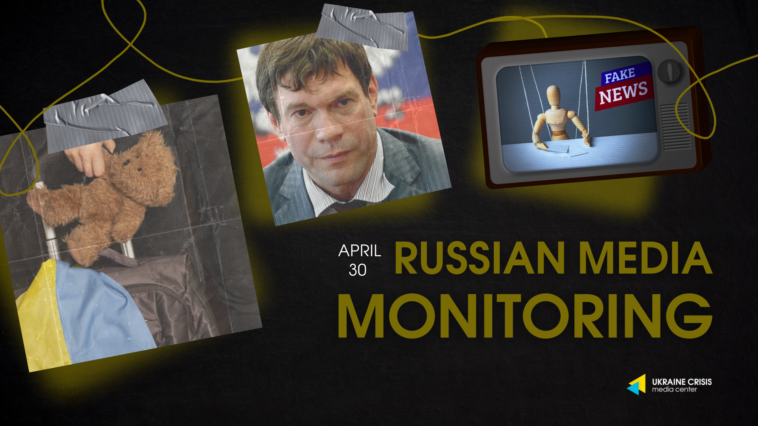On April 17, Ukraine’s National Police Chief announced that they had successfully located 161 abducted Ukrainian children on German soil in a joint effort by German and Ukrainian authorities. These children had been forcibly deported to Russia and Belarus before seeking asylum in Germany.
After identifying missing Ukrainian children in Germany, Russia’s propaganda demands an apology from the International Criminal Court (ICC) and claims the ICC’s arrest warrant for Putin is illegitimate after these children have been found.
A Kremlin’s Puppet in Ukrainian Politics
The Kremlin’s propaganda apparatus portrays Oleg Tsarev, an ex-Ukrainian MP who long fled to Russia and is now promoting Kremlin rhetoric from Russian airwaves, as a voice of reason and a saving grace in Ukrainian politics. But in reality, he is a mere puppet of the Putin regime.
In a recent interview with Kremlin-controlled media, Tsarev claimed that those who ended up in Russia did so of their own free will, as a safety precaution created by Russia when Ukraine simply “up and left them”. He tells how “Ukraine regards children as the state’s goods, a material of specific value”, and of his disbelief that no one ever considered Russia’s abduction of Ukrainian children to Crimea a good thing, keeping them from living under the constant fire of war.
“Children were in war and under constant attack, so we took them to Crimea, and they accuse us of doing so illegally. Did no one come to believe we were saving the children?
The propagandist here uses the tactic of “recontextualizing”. It entails reframing events or actions in a way that makes them appear more positive or acceptable to the audience. In this case, Tsarev is attempting to portray the forced relocation of Ukrainian children to Russia as voluntary and one made for their own safety, rather than an act of aggression or a violation of their rights. He attempts to justify or downplay Russia’s actions by claiming that Ukraine abandoned these children and that Russia provided them with a safer environment away from the war.
However, evidence indicates that during Ukraine’s counter-offensive in 2023, before Russia destroyed the Kakhovka dam, Russian forces intentionally placed Ukrainian children in camps near the Crimean border. This maneuver aimed to use them as human shields, obstructing any potential Ukrainian invasion into occupied territories as the Russian military feared Ukraine’s advancement.
Furthermore, the propagandist claims that the 161 children discovered in Germany demonstrate that the arrest warrant issued by the ICC, and calls from the West about Putin’s regime’s abduction of children, are true manipulations of the facts with no basis, given that all of these children were eventually found and Russia “wrongly accused”. “Does that mean we can expect an apology [by the ICC],” the host asks Tsarev. Tsarev and the “presenter”, however, conveniently fail to mention the number of children currently subjected to forced deportation from Ukraine to Russia, which is estimated to be at least 19,453 by the Ukrainian government estimates. Furthermore, Russia is currently holding 27,000 Ukrainian civilian hostages.
Lost in Translation
Tsarev tells of his “surprise” by the West’s disregard for Russia’s purported role in “saving” children through their relocation to Crimea, away from conflict zones. He echoes a common Russian narrative, arguing that because these children are Slavic, distinctions between Russian and Ukrainian are irrelevant—they are all Russian.
“They are our shared children, Slavs. What’s the difference, anyway? Russian. Ukrainian. It’s all the same thing, Russian.”
He suggests that the West’s oversight of this fact lends credence to Russia’s alleged abduction of Ukrainian children under international law. However, the very fact that these 161 children were discovered by Ukrainian and German authorities demonstrates that it is Ukraine and the West, not Russia, who are actively working together to find these children that Russia claims not to have abducted.
Moreover, Tsarev criticized the Institute of War Studies for its reporting on the daily abduction of children, claiming to monitor both Ukrainian and Western media closely. In doing so, he referenced “Island War Studies”, a humorous mistranslation by the propagandist who claims to analyze Western media. This mistake, while amusing, highlights a well-established truth: Russian propaganda lacks genuine interest in factual accuracy, evident in its distortion of reports due to a fundamental lack of understanding and language competency.
Tsarev’s assertions regarding Russia’s purported concern for Ukrainian children, whom he claims are “Russian anyway,” reveal a blatant disregard for their well-being. Instead, they suggest a willingness to exploit them for strategic advantage, whether as human shields or as manipulated youth indoctrinated to harbour hatred towards Ukraine. This is a tactic to thereby reduce the likelihood of a Ukrainian uprising in its occupied territories. Despite the positive development of Ukrainian authorities identifying 161 children in Germany, propaganda efforts seek to undermine this achievement. By cherry-picking favourable segments of the news, they aim to undercut Western institutions like the ICC and Putin’s arrest warrant, presenting the narrative as if all missing children have been accounted for, thus discrediting accusations against Russia. This distortion of facts serves as a manipulative tactic, preying on the vulnerabilities of Ukrainian and Western skeptics.

